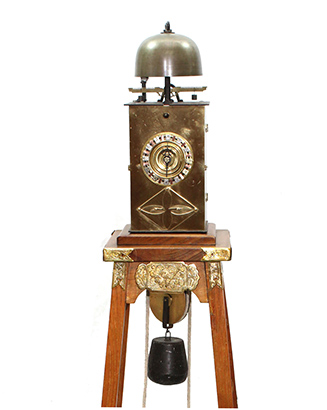Japanese striking Lantern clock – Kake Dokei

Japanese iron-framed striking kake-dokei (lantern clock), dating from the Edo period.
The iron posted movement is supported with iron top and bottom plates. It has a verge escapement regulated by a single foliot, visible below the deep bell. The single weight drives the two trains for the going side and strike. The brass case has opening side doors and is supported on an elm pedestal, adorned with pressed brass decoration.
Traditional Japanese timekeeping divided the day into unequal temporal hours: six daytime units from local sunrise to local sunset, and six night time units from sunset to sunrise. This system continued in Japan until 1873, when the Western form of timekeeping was adopted.
The outer chapter ring contains the 12 silvered engraved plates marking the temporal hours, and these can be spaced within the ring according to the time of year – in summer the daytime markers will be more spaced and the nighttime markers more condensed. Traditionally, these were moved twice monthly. These silvered digits are separated by bronze plates.
The black hand remains stationary whilst the dial rotates. Each digit has a backward-facing pin which triggers the countwheel striking mechanism, with a temporal hour strike descending from 9 to 4 times, and alternately 1 and 2 half-hour strikes.
Wikipedia has some interesting information on Japanese timekeeping, including the strike sequence.
- Height: 139cms
- Width: 37cms
- Depth: 37 cms
Overhauled and guaranteed for 3 years.